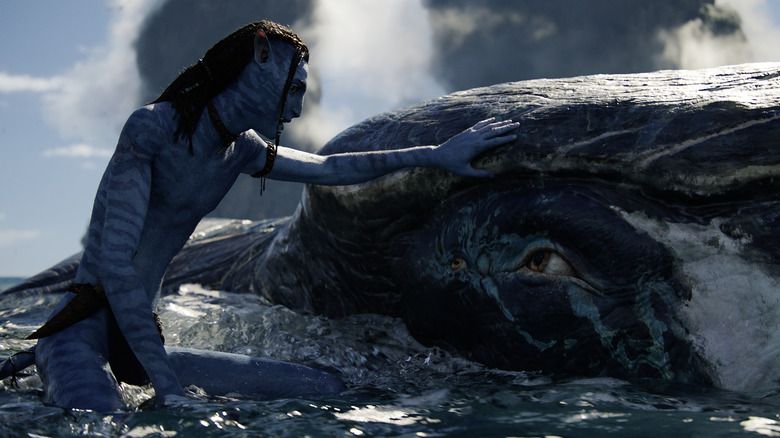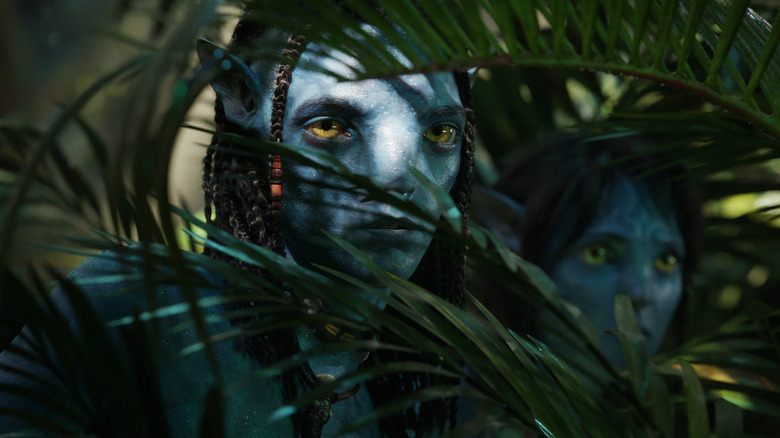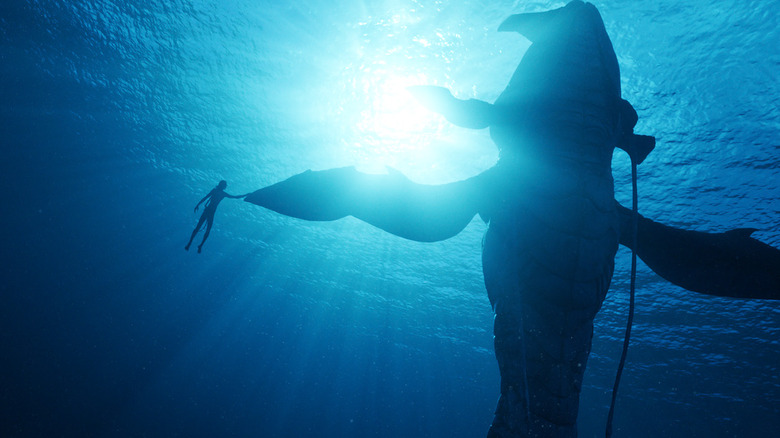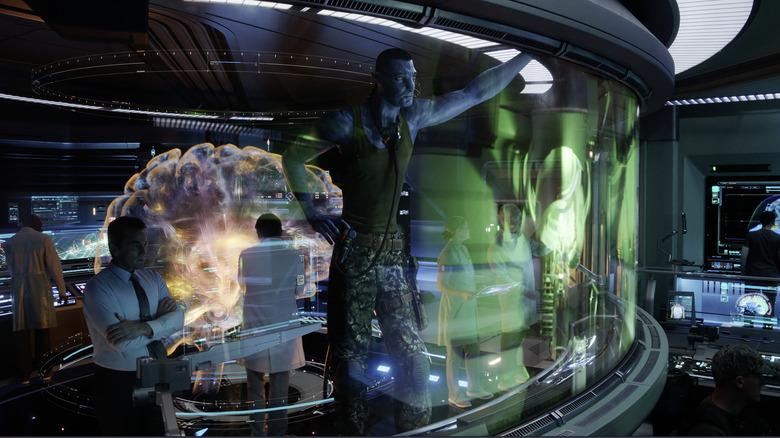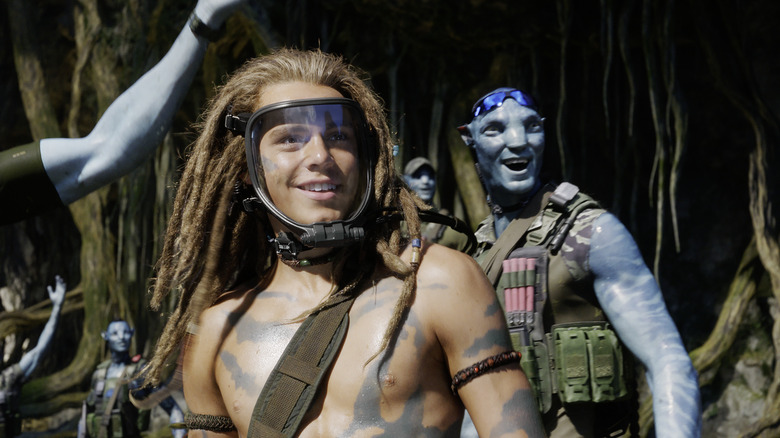The Avatar Franchise Is Built On Radical Acts Of Empathy
This post contains spoilers for "Avatar: The Way of Water."
I am hardly the first writer to point this out, but the state of the "Avatar" franchise is strange. The original film, released in 2009, quickly became one of the biggest box office juggernauts of all time. There's a Disney theme park land dedicated to it. Online fandoms for the film exist in surprisingly large numbers, and yet, right up until today's release of its sequel, "Avatar: The Way of Water," the debate on whether or not "Avatar" has the cultural significance and longevity to sustain its own box office goals has been loud and ongoing.
To be fair, while it's rarely wise to bet against director James Cameron, it's easy to see why many are cynical towards "Avatar." At its core, while it's telling a deeply anti-colonialist story, it's told from a white male POV, and this criticism is nothing new. Despite massive success, it has often been compared to other white savior stories about indigenous cultures, like "Dances with Wolves." The natural-but-alien world of Pandora and its Na'vi culture are a spectacle to behold, but "Avatar" often veered too close to the appropriation of Native American aesthetics.
Yet, despite these glaring issues, there's still something compelling about Cameron's optimistic worldview that resonates with a large, nearly universal audience. The "Avatar" franchise is built around radical acts of empathy. In the original film, Jake Sully's (Sam Worthington) grand act of empathy is his choice to save the Na'vi people against human colonization, despite his upbringing. In "Avatar: The Way of Water," empathy becomes the central theme that unifies each of the film's plotlines.
Na'vi refugees finding a new home
If there's one thing I gather Cameron fully believes in after watching both "Avatar" films, it's the belief that the fictional Na'vi are better than us greedy little humans. Instead of destroying Pandora's natural beauty, they've learned to live amongst the land and stay connected to its spiritual power. They also have something innately empathetic in their natures that doesn't come as easily for human characters in this universe.
In "The Way of Water," the Sky People are back to colonize Pandora once again. After a brutal attack on Jake and Neytiri's land, the Sully family decides to migrate to another colony that lives by the sea, the Metkayina, who gracefully allow the Sully clan a home and offer to impart their considerable survival skills. It's not a smooth transition, but with the amount of destruction and bloodshed at risk, the Metkayina know it's the right decision to open their hearts and show solidarity for their displaced fellow Na'vi.
While Jake and Neytiri (Zoe Saldana) are still significant characters in the sequel, their children are the ones who take the center stage. A solid hour of the film is dedicated to these children adjusting to their lives as refugees in a new environment. Their adopted daughter Kiri (Sigourney Weaver) fosters a spiritual bond with the nature around her throughout the movie. L'oak (Britain Dalton) struggles to live in the shadow of his perfect older brother Neteyam (Jaime Flatters). The youngest Sully child, Tuktirey (Trinity Jo-Li Bliss), hangs onto her innocence despite the looming threat of a cloned Quaritch (Stephen Lang) coming to tear this family apart.
L'oak and Payakan's beautiful companionship
Despite his combative and confrontational instincts making him the black sheep of the family, L'oak turns out to be much more like his father than he initially realizes. In the second act of "The Way of Water," the younger brother becomes stranded and hunted by a dangerous, shark-like predator. He is saved by a member of a majestic whale-like species, the Tulkun, who the Metkayina tribe consider to be their spiritual brethren — except this one has a missing fin and seems to only swim alone.
L'oak learns that the Tulkun who saved his life is named Payakan, and eventually is told that he was exiled by his kind because he went against his species' pacifist principles by attacking the hunters who murdered his mother. Unlike the rest of the Metkayina tribe, L'oak does not believe that Payakan's mistakes have to define his character, and neither should a sweeping moral judgment be made on his life. As outcasts of their respective clans, they connect with each other in special ways. It's a delight to see their companionship unfold and how that trust improves L'oak's outlook on his family.
Whether he knows it yet or not, despite the cold shoulder he often receives from Jake for his impulsiveness, L'oak's ability to see past the surface of Payakan's character is reminiscent of the profound empathy Jake had towards the Na'vi in their war against the RDA. Even when society is telling these characters what's right or wrong, they stay true to their own beliefs and are willing to fight for those who are suffering. This trust L'oak has in Payakan comes back around, and is ultimately what saves Jake from drowning in the climax of the film.
Holding true empathy isn't always easy
Then, there's Spider (Jack Champion), the teenage son of the original Colonel Quaritch who has been abandoned on Pandora ever since the Sky People first left. More Na'vi than human, he has lived amongst their people and adopted many of their cultural customs and philosophies. After the first battle with Quaritch in the forest, Spider gets kidnapped and spends a majority of the film with the clone of his father, witnessing the atrocities he commits against the Na'vi people and the natural world of Pandora firsthand.
"I am technically not your father, so we are nothing to each other" Quaritch says to the boy to maintain emotional distance. This is something that is surprisingly challenged when Quaritch has Kiri at gunpoint and Neytiri threatens him with Spider's life. Unexpectedly, Quaritch flinches, allowing the Sullys to escape. After Jake defeats Quaritch, he's left to drown in the wreckage of the sinking ship. In searching for Jake and Neytiri, Spider finds Quaritch, and despite his best interests, allows him to float to shore.
My crowd was very reactive towards the movie, but this particular moment elicited a moment of frustration and confusion. Though it isn't initially the most gratifying choice, Spider's decision to save what's left of his father is also a moment of profound empathy. Spider has no reason to love Quaritch, but leaving him to die knowing that there is that sliver of connection between them is not in his heart — especially not one that he developed living amongst the principles of the Na'vi. Sometimes, true empathy is not always easy, but it is noble.
Cameron is an artist of grand gestures, not subtlety
The "Avatar" films are often criticized for being simplistic, familiar, or thinly written. However, I'd argue the beauty of Cameron's filmmaking lies not in the complexities of his plots, but rather the massive scale he imbues into these specific emotional moments. The heightened drama of Jack and Rose drifting apart in "Titanic" is a simple image to conjure, but the execution holds so much dramatic weight. That same idea is behind every emotional beat in "Avatar," where the beauty of the natural world is captured in floating green mountains and water, and the horrors of mankind are personified through sterile laboratories and militarized mech suits.
But the underappreciated core of "Avatar" is in how Cameron portrays these epic, radical acts of empathy and associates not with the destructive human characters, but with Na'vi culture. This is crucial; it keeps his portrayal of the Na'vi people from feeling cynical or voyeuristic, despite all the other problematic elements at play.
In "Avatar: The Way of Water," Cameron is arguing that empathy is something that might be beyond human nature, but like Jake, L'oak, or Spider, it can be learned, and it is something we should aspire to.
"I see you" is not just a catchphrase, it's the entire philosophy of Cameron's vision of "Avatar."
